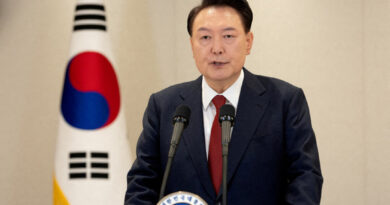Trudeau appoints LeBlanc as Finance Minister following Freeland’s resignation
After Finance Minister Chrystia Freeland resigned from cabinet, Public Safety Minister Dominic LeBlanc quickly stepped in to take on the role of finance minister, appointed by Prime Minister Justin Trudeau on Monday.
Freeland mentioned that she felt compelled to resign as the prime minister had lost confidence in her and wished to assign her a new role following disagreements over policy decisions.
Although calls for an election resurfaced after Freeland’s departure, there are no immediate plans for a vote as MPs are set to break for the holidays.
LeBlanc was sworn in as finance minister at Rideau Hall during a ceremony while the Liberal caucus was meeting in another location.
In her resignation letter, Freeland highlighted ongoing disagreements with the prime minister about the best course of action for Canada, especially in light of the incoming Trump administration’s 25 percent tariff threat.
Freeland emphasized the importance of taking the tariff threat seriously and maintaining financial reserves to navigate a potential tariff war, avoiding unnecessary expenses that may undermine Canadians’ confidence in the government’s response.
Conservative Leader Pierre Poilievre criticized Trudeau for the government’s lack of control and renewed calls for an election.
Meanwhile, NDP Leader Jagmeet Singh urged Trudeau to resign, citing the challenges faced by Canadians and the looming tariff threats from Trump.
However, Singh did not confirm immediate plans to bring down the government through a House of Commons vote, keeping all options open.
Bloc Québécois Leader Yves-François Blanchet suggested dissolving Parliament and calling an election to address the escalating tensions with the Trump administration.
Despite internal disagreements within the Liberal Party, with some MPs calling on Trudeau to step down, the prime minister remains determined not to resign, exploring various options, including proroguing Parliament.
Freeland’s resignation coincided with the delivery of the fall economic statement, revealing a higher deficit than anticipated, prompting measures to address the border security demands posed by Trump.
Trudeau and Freeland’s absence during question period was noted, with Poilievre pointedly questioning the lack of a finance minister.
Amidst the political uncertainty, Housing Minister Sean Fraser announced he would not seek re-election to prioritize his family, stirring discussions about potential future leadership replacements.
Overall, cabinet ministers expressed confidence in the prime minister and affirmed their commitment to the fiscal update despite recent challenges.
Trudeau’s government faces pressure to address the affordability crisis and regain public trust to secure success in the upcoming election.
Rumors of a cabinet shuffle have surfaced, following several ministers opting not to run in the next campaign and previous resignations within the government.
At a premiers’ meeting, Ontario Premier Doug Ford emphasized faith in the provincial leaders rather than explicitly backing Trudeau’s leadership against the tariff threats.





